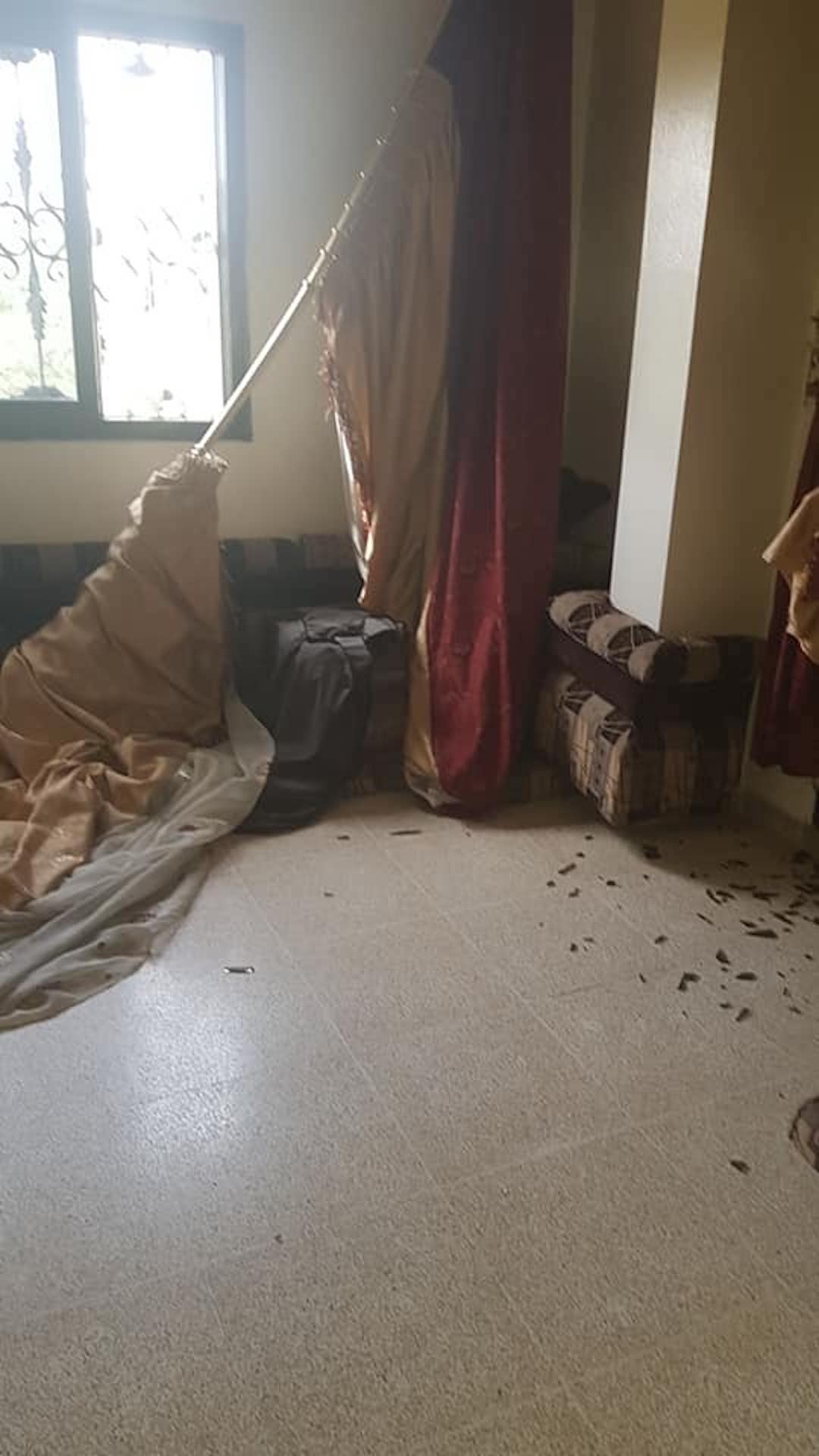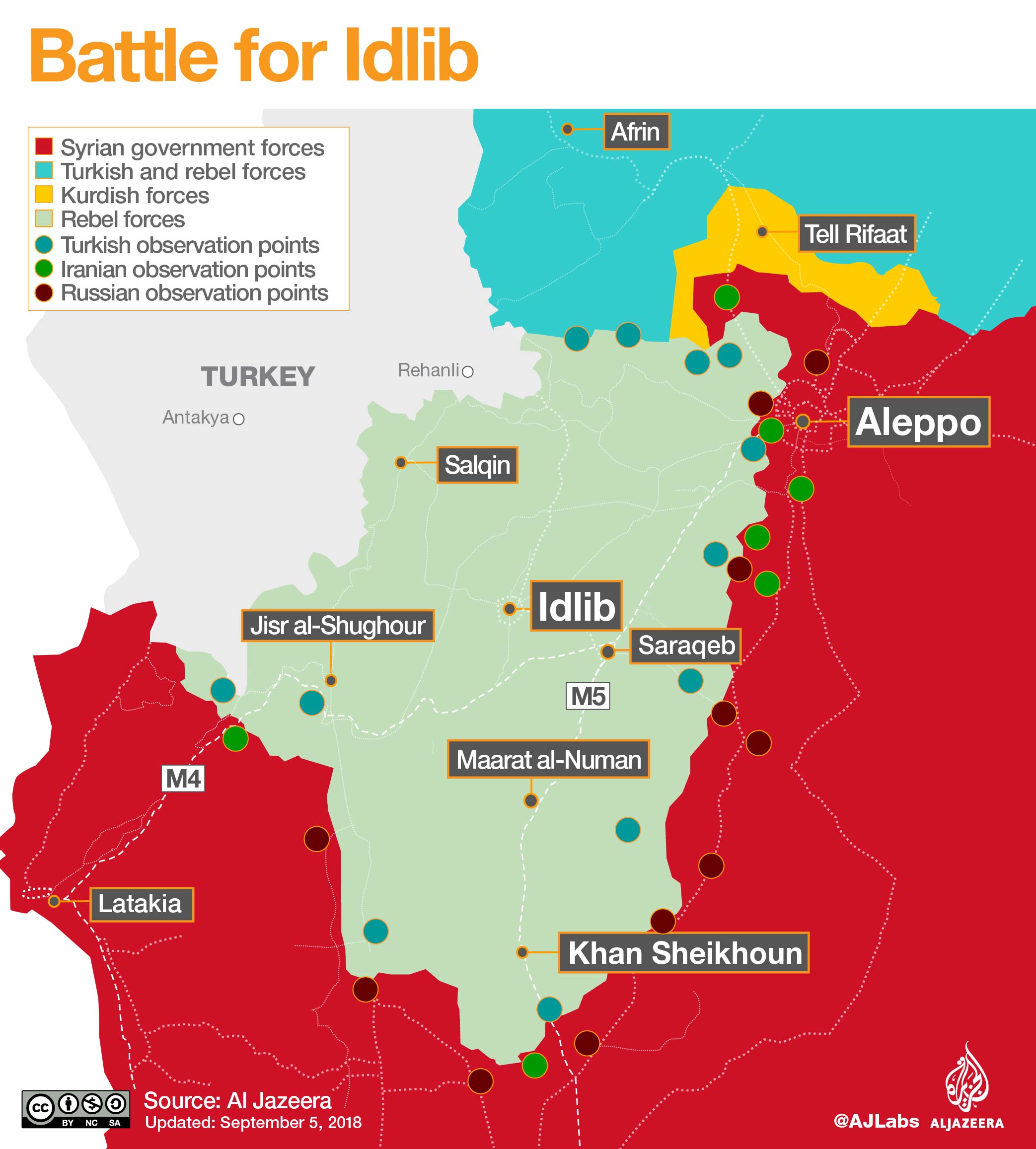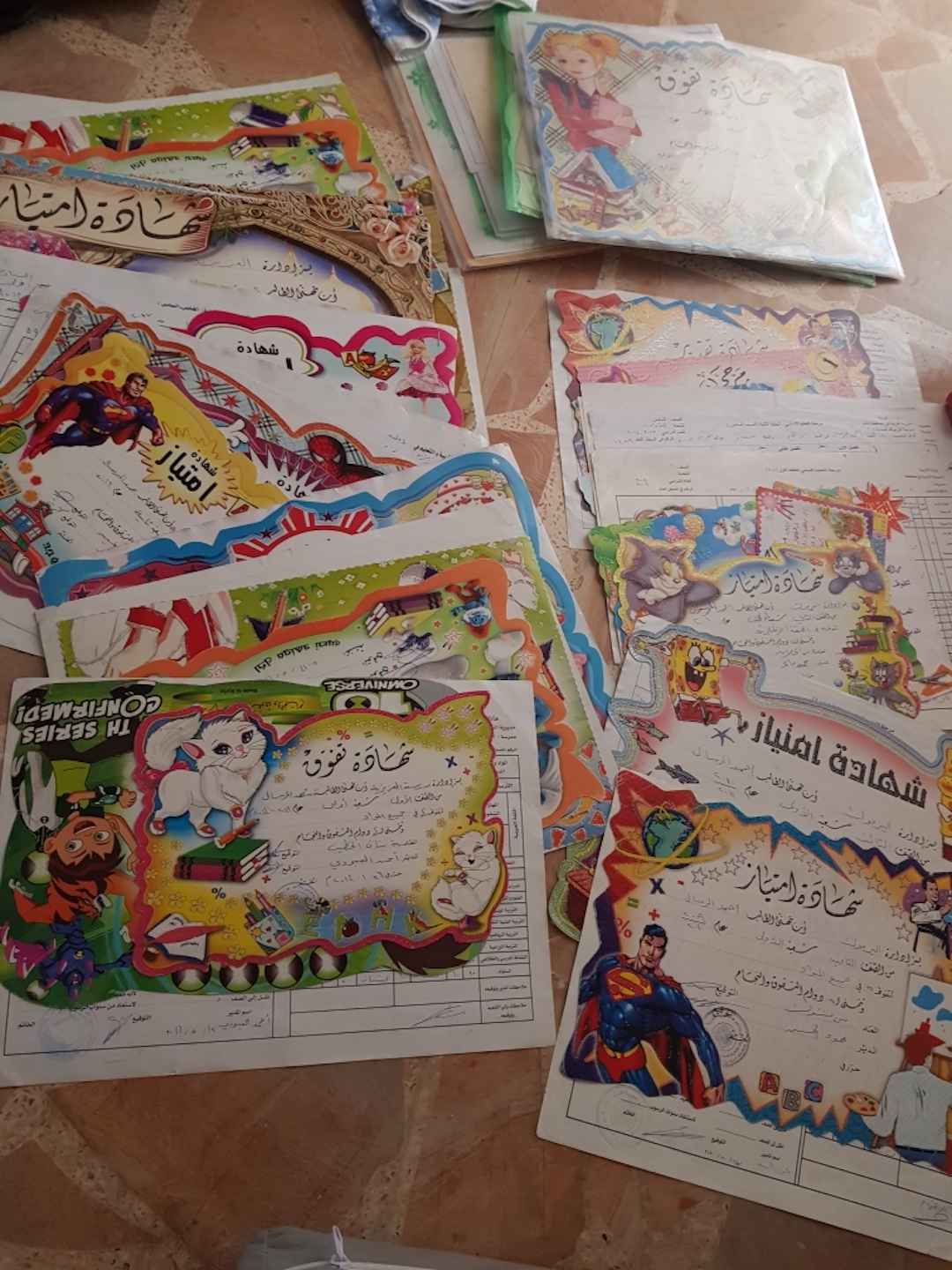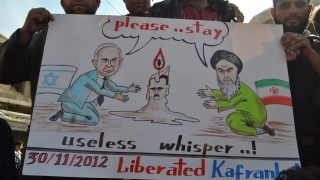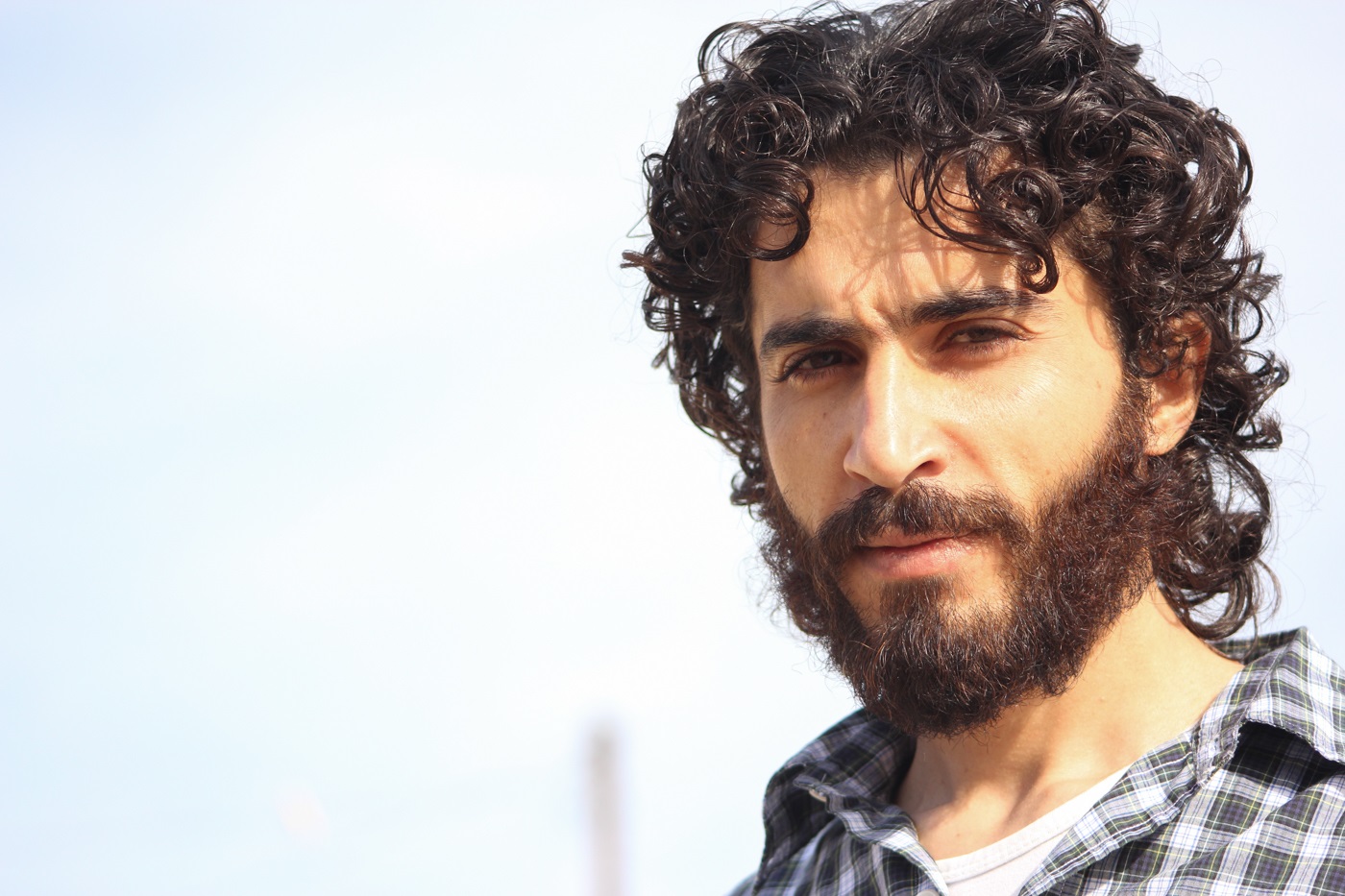With the news of the Battle for Idlib covering the pages of newspapers and featuring in news report, we read and heard about how intense the battles are, How many airstrikes the Syrian regime carried and how many hospitals have been targeted by the regime and its Russian ally. After nearly two months of battles, the Syrian regime doesn’t seem to be able to advance or take more land. We read extensive analysis about the opposition factions and about the Jihadi coalition lead by Hayat Tahrir al-Sham HTS. But what about the civilians who live in Idlib today? The UN estimated that there are 20,000 HTS fighters in Idlib, few thousands more of the other brigades and nearly 3 million civilians in the last opposition stronghold.
Soud Al-Asowad is a mom of six from the town of Kafr Nabl, and she told SyriaUntold what life is like for her and her family, and for many other civilians stuck in the area.
It was Ramadan, the Islamic holy month of fasting, people abstain from eating or drinking from dawn to dusk, and as the maghrib prayer is announced from minarets, families gather around Iftar tables having spent the day preparing varied meals and salads. It is a time of worship, but most importantly, it is a time when the family comes together. Or so was the case before the Syrian war.
“After we had eaten some food to break our Ramadan fast, two missiles hit the street we lived in. I saw shrapnel flying around my children like knives. Moments later, when I realized we had all survived, I decided to leave my town, despite refusing to do so before.”
Souad is from Kafr Nabl, the small town in north Syria joined the uprising against the Syrian regime in its early days, and the demonstrations in the town became best known for the political cartoons carried by the protesters week after week for years. The cartoons were sharp political commentary; against the crackdown of the Syrian regime, about the war and criticizing the reactions of the international community towards it, and later against the Islamists when they took over the town and started expelling the other factions out of Kafr Nabl and the opposition-held North generally.
But long gone are the days of cartoons and demonstrations. Since the collapse of the de-escalation agreement between Russia and Turkey on April 30th, the town has witnessed heavy bombardment, and Souad, like many of the town residents had to flee her home.
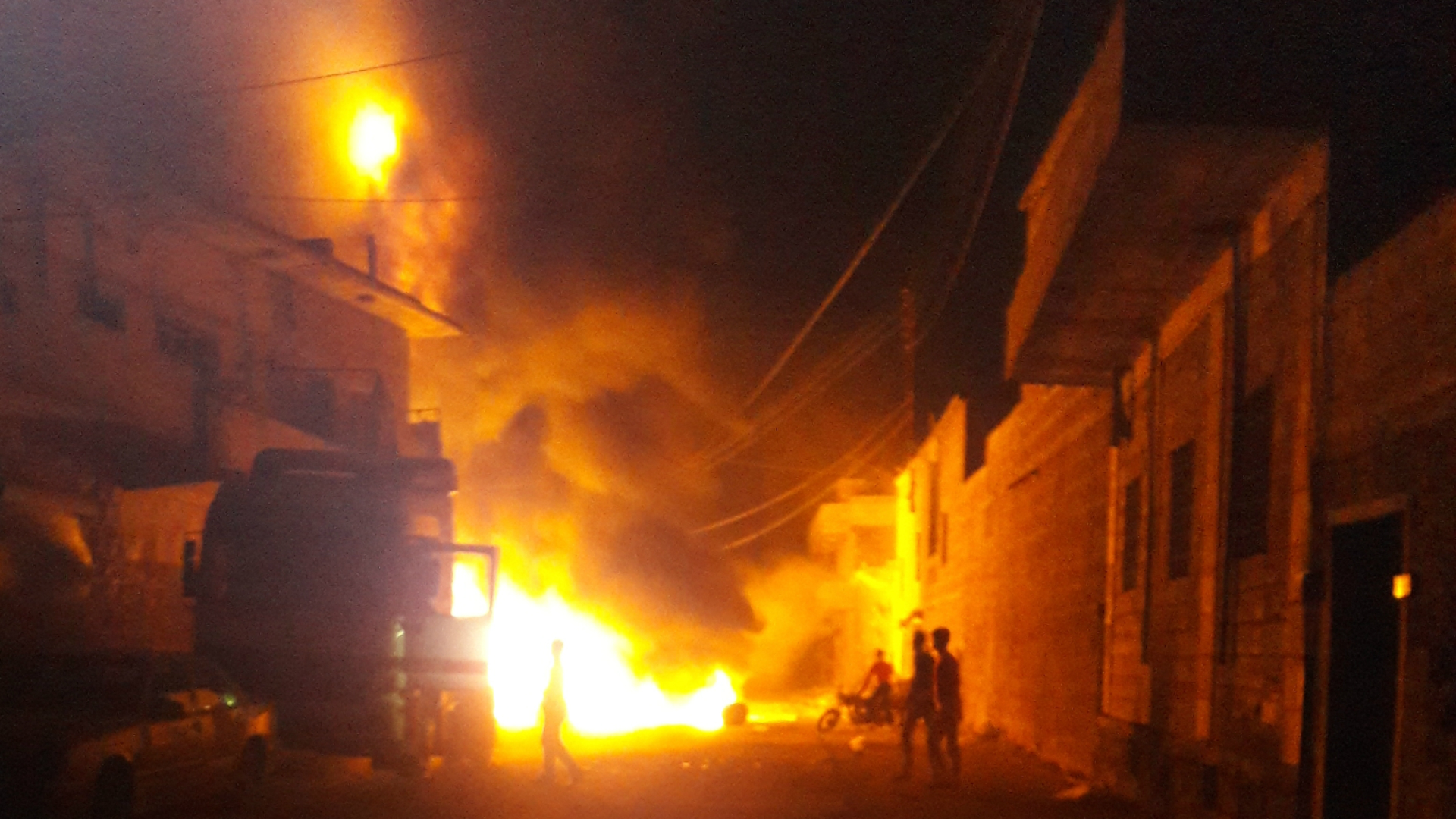
Aware of how acute the danger to her children lives is, Souad and her husband decided to leave. But her elderly father refused to accompany them, “we tried our best, but he persistently refused to leave his home, I will not leave my house except to my grave he told me”. They left in a hurry and didn’t carry much with them.
They spent their first night away from home in a damp basement in Sarmada town. The basement belonged to a friend and was empty, and they slept on the cold floor. In the morning her children were sick, and she decided she needed to go home to bring warm clothes and blankets from her house.
In a testimony written on Facebook she said, “My husband wanted to go with me but I refused; I didn’t want my children to lose their both parents in an air strike. I left in a hurry; I held my tears in front of my children, the last thing I heard was them begging me not to go”
“When I arrived at Maraat Al-Nu’man, about 15km from my town, I asked the driver to turn his walkie talkie on so we could hear of incoming airstrikes. I told him, ‘keep driving, if death is destined for me, so be it.’
When she finally reached her town, she was saddened to see buildings destroyed by airstrikes. She first went to check on her father who stayed in town, and then later that evening she went to her house where she collected the essential things she needed. Souad struggled to find a truck to help her move her things, people are afraid to drive around.
She and her family went to a town closer to the Turkish border; Salqin, where they are safe from shelling but they now face different fear: are they going to be able to continue providing for their children? As Souad arrived to the town, she saw people sitting in the streets and learned they are living in olive orchards near the town. They simply couldn’t afford to rent, there are not enough places and the rents are exorbitant, many simply can’t afford it. For Souad and her family, they had to share two rooms flat with 38 other members of her extended family to be able to afford having a roof over their heads.
“In earlier waves of displacement from Ghouta and Aleppo, they have prepared tents for the displaced. In Idlib, things are different this time around, and there are no preparations and no safe camps to host the displaced”, Souad said that she, and all the others who had to flee their towns affected by the bombing nearer to the frontline, were left to their own means. They had to chose which town to go to and try to arrange housing for themselves.
Unsure of the future, Souad and her family are managing one day at a time, “we arrived there not knowing what the future holds, will we be able to find shelter for us there? How would people treat us? In Salqin, we found the locals were extremely ruthless. The rents they are asking the displaced to pay is very high, the prices of everything is exorbitant, even vegetables! They put all the prices up, as if we are here as tourists!”,
Souad is angry about the regime’s bombardment and the world lack of action to protect them, but the way she was treated in Salqin added insult to her injury, “people have no empathy with your ordeal, as if they are not Syrians!”. Salqin is closer to the border, the area didn’t witness the heavy battles they in Kafr Nabl had to endure, and that might be why “thay can’t empathize with what we went through” Souad said.
Souad sighed, "there is an entire family who went back to our town, they couldn't afford renting, and they all died under the rubble of their home after it was hit by an airstrike'.
War is the ultimate test for human nature, and Souad and her husband are aware of that. In these times of difficulty and uncertainty, they made a choice. They believe it is the ethical choice to make, but their choice will only add to their insecurity. Afrin is a town in Aleppo governorate in north Syria. The Opposition-held Syrian north is now divided into two zones: one is a Turkish influence zone; where a coalition of rebel factions supported by Turkey controls the area. Souad refers to these areas as the Daraa Al-Furat area, Arabic for Euphrates Shield zone, after the name of the battle these factions launched to take these areas. When they attacked Afrin to expel the Kurdish YPG forces out of the town in an attempt to solidify their power and prevent the Kurds from establishing an autonomous rule close the border with Turkey, Turkish military forces spearheaded the attack. Amnesty accused these brigades of human rights violations in Afrin, one of which was the acquisition of the houses of the local Kurdish population who fled the area.
That was Souad’s ethical choice.
The second zone is Idlib city and Hama northern countryside, and it under the control of a coalition of Jihadi groups lead by HTS. That is the zone being bombarded now, and that is where Souad’s town is. Military leaders in Daraa Al-Furat area offers those displaced from bombed areas in Idlib one of the appropriated houses in exchange for one-off payment of 1000 dollars. “You go to a house, and they say to you, give us a thousand dollars and it is yours, ok, well, I thought about it, and I said that is haram, how is that different from stealing?!”. Souad and her husband dismissed the idea, “Yes, it would be cheaper for me than paying rent, but in principle if I behave wrongly and others allow themselves to behave like that as well, our society is lost!”.
And while those who should share her cause are being exploitative of her ordeal, the regime and its Russian backers are showing no mercy. The Syrian Observatory for human rights says 512 civilians died since the beginning of the bombing campaign, including 130 children. Opposition sources says more than 20 hospitals have been destroyed and Amnesty accused the Syrian regime of not sparing civilian infrastructure including schools and hospitals.
After fleeing to make sure their children will be safe from bombing, Souad is now concerned for the future of her children, two of her six kids had to leave before the end of year exams. They are a 9th grader and a high school graduate and these exams are vital for their future. The Interim Government who runs the civil affairs in Idlib said it will ensure all students sit their end of year exams and that no student will miss a year as a result of the last wave of bombardment, “even if it had to run these exams in the olives groves” one statement said.
Souad and her husband travelled to Idlib city to register their new address and have their kids reallocated to new schools and exam centers, “despite our poverty and our displacement, despite all the challenges we had to survive, they are still very determinant that their education is their only weapon”. When They left their home in a hurry, her daughters asked their mom to take one thing with them, all their school merit certificates. “This is what gives us strength, to see our children still have the will to continue”.
No school are still functioning in Kafr Nabl, and in most of the areas under bombardment.
Souad says securing a prospect for her children education might be the only reason why she might take the jeopardous journey of being smuggled to Turkey, “many people got killed while crossing the borders.”. Souad is hoping the bombardment will stop soon and they can all go home, but “if the situation continues as it is now, there are no prospects for their education. So if I ever consider the dangerous crossing to Turkey, it would be for their education.”
Turkey’s borders are closed, in fact Turkey says that the two main aims it has in Syria right now are to prevent the formation of an autonomous Kurdish state, and to prevent more refugees crossing into its land, it already hosts 3.5 million Syrians.
In Salqin, the rent is not the only financial challenge the family face, there is so little services infrastructure they have to buy electricity and drinking water from private contractors, and the prices are unaffordable for most. “You pay a subscription to get electricity, you pay per Ampere, and we can hardly afford turning the lights on.”. There is one public clinic still working in Salqin, and it hardly has any equipment or medicines left, private care is still available, though limited and beyond the means of the displaced.
But is there a way out of this deadlock? Souad thinks this battle is existential. “In Ghouta, the regime wanted a demographic change. But here the war is a war of extermination”. In Ghouta and other formerly opposition-held towns, the regime besieged these areas for years and eventually offered the rebels a way out as part of their surrender, they were sent in convoys of public transport green buses to Idlib. But this time around, and while Turkey doesn’t seem willing to open the borders, there are no areas in Syria left for them to go. “There is no such option, no green buses, It is the rebels last refugee, and that is why it is an existential battle for them and for us.”
A Timeline
-Idlib joined the protests in 2011, the city and its countryside witnessed many demonstrations calling for freedom and political change. The regime cracked down arresting hundreds and soon after clashes with the security forces started.
-June 2011, the Free Syrian Army FSA was established by army defectors.
- Early 2012 Idlib witnessed many confrontations between the opposition fighters and the regime forces. Scores were killed in the city by regime’s crackdown and the opposition attacked regime checkpoints and advanced into the city. The regime launched a battle to retake the city and in April 2012 it retook the city center, but the rebels continued guerrilla warfare, attacking regime’s posts.
-In March 2015, Rebel fighters from Jubhat Al-Nusra, Al-Qaeda Affiliate in Syria, and Ahrar Al-Sham Islamic movement launched an attack on the city and captured it after few days of intense battles.
-Between 2016 and 2018, opposition fighters from different areas across Syria were displaced to Idlib from their towns according to “reconciliation agreements” by which these rebels surrendered the areas they once controlled in East Aleppo, Rural Damascus, Eastern Ghouta and other various locations across the country back to regime control. The rebels handed back their heavy weaponry and accepted the regime political and military control over their towns, even serving in its army. Those who refused the terms of surrender, whether combatants or civilians, were bussed with their families to Idlib. One-third of the population of Idlib today are those who were displaced from elsewhere in Syria.
-Between 2015 and 2018, inter-rebel fighting broke out, Jubhat Al-Nusra, which later rebranded itself as Hayat Tahrir Al-Sham HTS, gradually expelled all other opposition and rebels groups, it first fought the American backed FSA Division 13 in March 2016.
- On 4 September 2018, at least ten Russian aircraft launched dozens of air strikes over the southern and western part of the governorate of Idlib, which led to the large bombing campaign in Idlib Governorate. Turkey started sending more troops and boosting defences in the frontlines and warned the regime and Russia of a humanitarian disaster. An estimated 20,000 HTS fighters are in Idlib, and 3 million civilians.
-On 17 September 2018, the Russian president Vladimir Putin and Turkish president Recep Tayyip Erdogan reached an agreement to create a demilitarised buffer zone in Idlib. The deal included that the buffer zone will separate the two sides and stretch from about 15 km to 25 km. Troops from Russia and Turkey will patrol the zone, and Jihadist rebels have to abandon the areas, and retreat further in the Idlib province. The agreement also stated all tanks, artillery and mortars belonging to conflicting parties will be withdrawn from the demilitarized zone. It also included that the M4 and M5 highways are to be open by end of the year, linking respectively Latakia, Damascus and Aleppo.
- Many in the International actors involved in the Syrian war welcomed the deal including Iran, Turkey and the US. Locally the Syrian regime welcomed the agreement. However, its officials still vowed to the press to retake "every inch of Syria".
The Syrian opposition welcomed the deal . While Hayat Tahrir Al-Sham HTS rejected some of the conditions of the deal. Many other Jihadi factions rejected it completely, including Ansar al-Din front and Hurras al-Din.
-According to the deal, Turkey tried to convince HTS to dissolve itself and allow its local fighters to become part of an umbrella group supported by turkey, while its foreign fighters will be guaranteed safety. All these efforts ended with HTS takeover in Idlib. Meanwhile, the Syrian regime resumed shelling and attacked positions held by HTS and its allies, in the Hama-Latakia-Idlib axis.
- In Januray 2019, Hayat Tahrir al-Sham HTS staged a violent takeover, expelling the remaining Turkish-backed rebels from south-west Idlib. HTS is still designated as a terrorist organisation by the UN. The Turkistan Islamic Party, mostly Chinese Uighur group is closely allied to HTS and is estimated to have a few thousand fighters. Hurras al-Din, which is considered al-Qaeda's new Syrian branch have several hundred fighters.
- Nearly 300,000 people are displaced by the latest fighting. Two-thirds of whom are living in open fields or sheltering under trees.
-The Syrian Observatory for Human Rights reported 1906 died in opposition held-Idlib since the collapse of the de-escalation agreement in April 30th, this number includes “130 children and 102 women killed in aerial bombardment and missiles strikes”. The observatory noted that the casualties on the regime side were “36 civilians, including 15 children and 8 women”.
-The Syrian Network for Human Rights has reported that 24 hospitals and medical centres have been targeted since the beginning of the battle.


